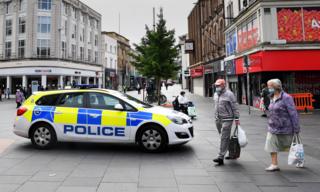 Image copyright
Getty Images
Image copyright
Getty Images
The UK's first local lockdown has been introduced in Leicester, following a spike in coronavirus cases.
How will such restrictions be enforced and could they be used elsewhere?
Who decides when a local lockdown is needed?
It depends whether there is a cluster or an outbreak.
A single premises with a coronavirus cluster is likely to be closed temporarily by the local director of public health and the Health and Safety Executive, and must legally remain shut.
These powers have been used previously to deal with salmonella or Legionnaires' disease outbreaks.
If there is evidence of a bigger coronavirus outbreak in a town, city or region, several organisations decide the response.
England's chief medical officer can advise a minister to use existing emergency powers to control it. This could mean introducing legislation which doesn't need voting on in Parliament.
Local authorities will for the first time be given access to postcode-level data about the number of people testing positive for coronavirus in their areas.
An agreement, signed individually with councils over the past week, gives them access to a digital dashboard which shows extremely localised test results.
What could a local lockdown involve?
In Leicester, it will be similar to going back to the UK-wide lockdown introduced at the end of March.
Residents will have to stay at home as much as they can, while people in other parts of England will have more freedom.
- Non-essential shops have to shut again
- Hotels and places of worship must also close, although ceremonies can be broadcast and funerals may take place
- Local Covid-19 testing will be stepped up
The reopening of pubs and restaurants for consumption on the premises, and the relaxation of social distancing across England on 4 July to "one metre plus", will not apply.
Non-essential travel to, from and within Leicester should also be avoided.
But a future lockdown in another place might not be so tough. It will depend on the nature of the coronavirus spike.
"It might be closing schools again if the increase is only seen in children and teachers," says Dr Nathalie McDermott, clinical lecturer in infectious diseases at King's College London.
"Or it might be not opening restaurants and bars because you're concerned about the direction the trend is going in."
Why are Leicester and its suburbs in lockdown?
Mr Hancock told the Commons on Monday the city had "10% of all positive cases in the country over the past week".
Leicester's seven-day infection rate of 135 cases per 100,000 people was "three times higher than the next highest city". Admissions to hospital were between six and 10 per day - compared to about one a day elsewhere.
Its local lockdown will be officially reviewed in two weeks although the Health Secretary Matt Hancock can end it at any time.
Could offices, factories or schools be closed instead?
The city-wide lockdown was brought in because "targeted action" had not worked, Mr Hancock said.
When many Covid-19 cases are found in one place like a hospital, factory or school, this is called a cluster. They can be dealt with by local directors of public health, often by closing the premises.
There have already been clusters in several parts of the UK:
When different clusters are found to be linked, this is defined as an outbreak.
Can police enforce the lockdown?
Police have powers to enforce the local lockdown, for example, if they believe that somebody is staying overnight somewhere other than where they live they can tell them to return home.
Police can also fine people for breaking the rules, with fines starting at £100, as before.
And they may also issue a "prohibition notice" directing somebody not to do something.
Have other countries tried local lockdowns?
In Germany, local authorities have the power to vary the level of restrictions in individual states, and a number of small lockdowns have been imposed recently.
One has also been enforced in parts of China's capital, Beijing after a recent outbreak.
What has been said about the rest of the UK?
Public Health Wales said that a local lockdown was under consideration after the recent outbreak in Anglesey. However, First Minister Mark Drakeford said that any decision would be not be taken lightly.
The Scottish government - for which public health teams work for the NHS, rather than councils - says it is developing a "responsive system of community surveillance" at a national, regional and local level to identify outbreaks quickly.
In Northern Ireland, the government says that any potential clusters or outbreaks will be handled using "appropriate infection control" in line with its normal guidelines for handling an outbreak of a disease.